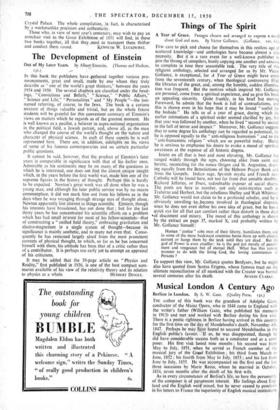Things of The Spirit
A Year of Grace. Passages chosen and arranged to express a mood
about God and man. By Victor Gollancz. (Gollancz. los. 6d.1
FEW care to pick and choose for themselves in this restless age of scattered knowledge—and anthologies have become almost a dire necessity. But it is a rare event for a well-known publisher to join the throng of compilers, busily copying one another and anxious to complete in time their seasonable task. The very title of this religious anthology, selected and arranged for us by Mr. Victor Gollancz, is exceptional, for A Year of Grace might have come from the seventeenth century, when theological controversy filled the libraries of the great, and, among the hinnble, sudden alumina. tion was frequent. But the motives which inspired Mr. Gollancz are personal, come from a spiritual experience, and so give his book an appealing sincerity. Quite frankly, in his brief but moving Foreword, he admits that the book is full of contradictions, and this is shown even in his hope that it may be found "useful for the bedside." He tells us of a year of grace, during which his earlier intimations of a spiritual order seemed clarified by joy, but that year was followed by another, when he lived "second by second in the hell of terror and despair." Moreover, Mr. Gollancz suggests that to some degree his anthology can be regarded as polemical, for -he is opposed equally to the "anti-religious humanism" and to the "anti-humanistic religion" which are so powerful today. Hence he is anxious to emphasise his desire to evoke a mood of spiritual awareness at the expense of all historic dogma.
Intent on all that is best and most elevating, Mr. Gollancz has ranged widely through the ages, choosing alike from saint and heretic, reconciling for the nonce Origen and St. Augustine, draw- ing equally from the Benedictions of the Hebrew Prayer Book and from the Gospels. Indian sage, Spanish mystic and French neo- Catholic will be found here, not too far from that amiable doubter, Richard Jefferies, or Ibsen, -redoubtable exposer of social shams. The poets are here in number, •not only semi-mystics such as Traherne and Herbert, but the rebellious Shelley and Walt Whitman. Mr. Gollancz would not claim to be a profound scholar, and he is • obviously unwilling -tcr....become involved in theological disputes, since he does not even definehis Own idea of grace, but he has a quick eye for all that can comfort rather than disturb in these days of discontent and misery. The mood of this anthology is shin% n by the extract on page 37, marked X, and probably written by Mr. Gollancz himself: Human " justice " robs men of their liberty, humiliates them, and in some of the more backward countries burns them up with electric current or hangs them by the neck until they are dead. But thz god of Power is even crueller: he is the god not merely of punish- ment and .vengeance but of eternal Hell. What has this remote - monster to do with the living God, the loving communion of Persons ? • To support this view, Mr. Gollancz quotes Berdyaev, but he might also have quoted from Scotus Erigena, whose famous tract on the ultimate reconciliation of all mankind with the Creator was burned






































 Previous page
Previous page